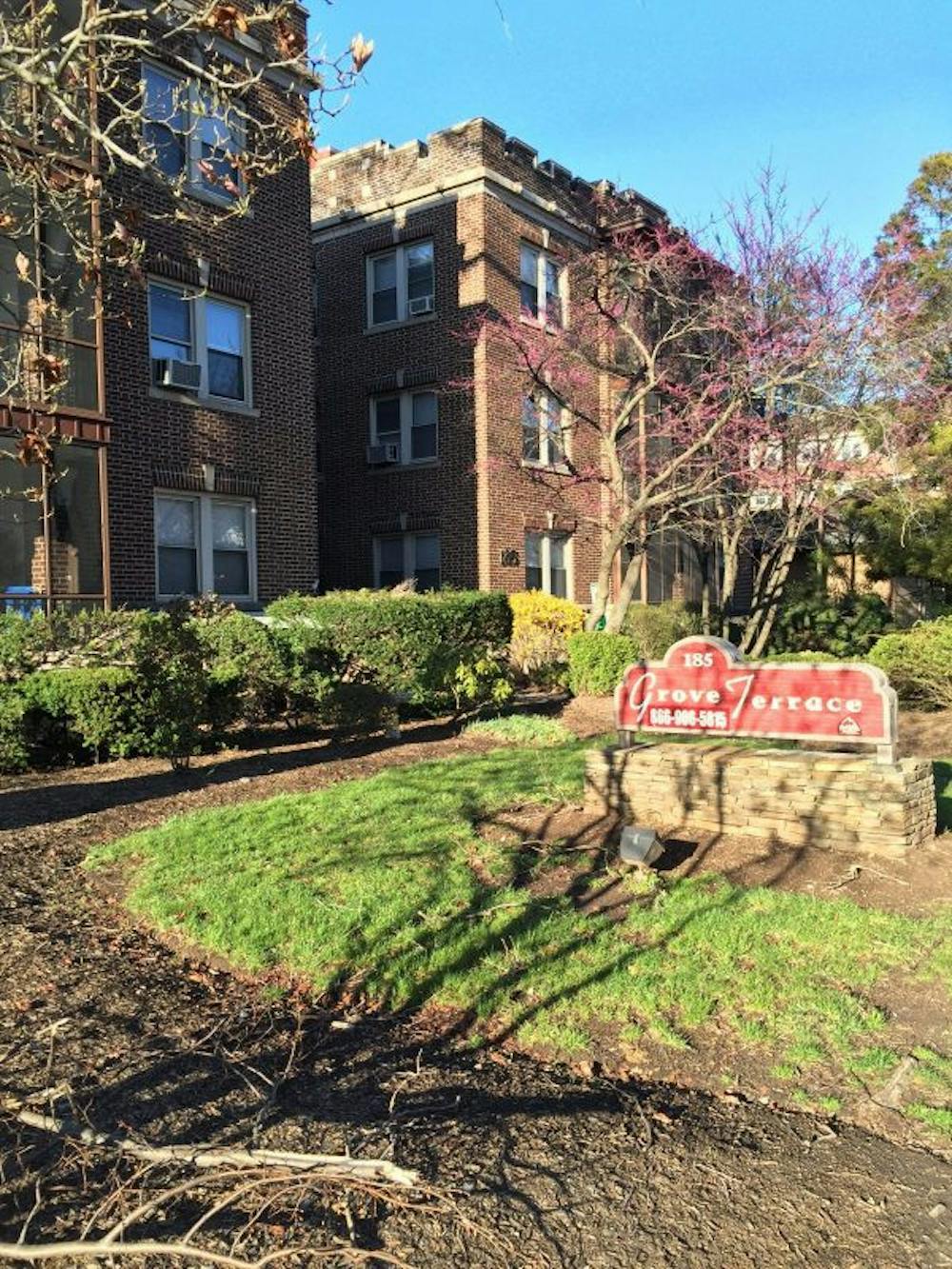Emails for housing deposits were sent out last week, signaling that the mad rush for housing both on and off campus has begun.
Over the last few years more and more students are choosing to come to Seton Hall. In 2015, SHU saw an incoming enrollment of 1,408 students, which caused a strain on housing and forced students to seek temporary accommodations on the Rutgers University - Newark campus.
[caption id="attachment_17629" align="aligncenter" width="768"] Grove Terrace is one of many off-campus apartment options for students to live in. Tristan Miller/Staff Photographer.[/caption]
This year, 34 percent of the slightly smaller freshman class of 1,246 students is from out of state, according to Alyssa McCloud, vice president of Enrollment Management. As housing is not guaranteed past freshman year, a significant number of older students seek off-campus housing.
Alec Meehan, a junior social and behavioral sciences major who lives in Xavier Hall, said, “One reason as to why I decided to move off campus next year was because I didn’t feel like there was a community feeling. I felt as though it was every man for themselves.”
Another reason students decide to move off campus is to save money.
Kelsey Buonaiuto, a senior psychology major, said, “I saved a lot of money living off campus. It went from $8,000 a year to almost nothing.”
The average student pays $12,254 a year for on-campus room and board at SHU, according to startclass.com, an education site that provides data on college costs.
While South Orange can be an expensive place to live, there are affordable housing options.
According to Ivy Hill Park Apartments’ website, it has a wide array of apartment styles ranging from a $700 studio apartment to a $950 two-bedroom. Living off campus can save students at minimum almost a thousand dollars.
Karissa Agosto, a senior nursing major, said that she and her friends each pay closer to $500 per month for their apartment just blocks from the front gate.
While Agosto agreed that finances are a big reason to move off campus, she values the independence it has offered her.
“Campus living is completely catered to the students’ ease, that I do miss, but having the freedom to have people stay with me or cook my own food has made it worth it,” Agosto said.
For the coming year, Cheryl McCloskey, assistant director of Housing Operations and Marketing, said the University will only accept the first 1,200 deposits for returning students and 1,250 deposits for incoming freshmen. That is the exact number of beds available at Seton Hall. This is why it is crucial for students to get their affairs in order before the Feb. 28 deadline.
“Approximately 70 percent of our freshmen class live on campus. The percentage declines as the class years increase as students elect to live closer to internships, clinicals, and student teaching opportunities,” McCloskey said in an email interview. “Altogether, over 50 percent of our undergraduate, full-time students elect to live on campus.”
While figuring out whether or not to move off campus can be a stressful undertaking for students, many agree that it is a positive change.
Toni Gardner, a senior social work major, said living on her own is worth it.
“I love the freedom of living away from my parents. I also love the fact that I can wake up 20 minutes before class and still make it to campus on time,” Gardner said.
Brynne Connolly can be reached at brynne.connolly@student.shu.edu.
Grove Terrace is one of many off-campus apartment options for students to live in. Tristan Miller/Staff Photographer.[/caption]
This year, 34 percent of the slightly smaller freshman class of 1,246 students is from out of state, according to Alyssa McCloud, vice president of Enrollment Management. As housing is not guaranteed past freshman year, a significant number of older students seek off-campus housing.
Alec Meehan, a junior social and behavioral sciences major who lives in Xavier Hall, said, “One reason as to why I decided to move off campus next year was because I didn’t feel like there was a community feeling. I felt as though it was every man for themselves.”
Another reason students decide to move off campus is to save money.
Kelsey Buonaiuto, a senior psychology major, said, “I saved a lot of money living off campus. It went from $8,000 a year to almost nothing.”
The average student pays $12,254 a year for on-campus room and board at SHU, according to startclass.com, an education site that provides data on college costs.
While South Orange can be an expensive place to live, there are affordable housing options.
According to Ivy Hill Park Apartments’ website, it has a wide array of apartment styles ranging from a $700 studio apartment to a $950 two-bedroom. Living off campus can save students at minimum almost a thousand dollars.
Karissa Agosto, a senior nursing major, said that she and her friends each pay closer to $500 per month for their apartment just blocks from the front gate.
While Agosto agreed that finances are a big reason to move off campus, she values the independence it has offered her.
“Campus living is completely catered to the students’ ease, that I do miss, but having the freedom to have people stay with me or cook my own food has made it worth it,” Agosto said.
For the coming year, Cheryl McCloskey, assistant director of Housing Operations and Marketing, said the University will only accept the first 1,200 deposits for returning students and 1,250 deposits for incoming freshmen. That is the exact number of beds available at Seton Hall. This is why it is crucial for students to get their affairs in order before the Feb. 28 deadline.
“Approximately 70 percent of our freshmen class live on campus. The percentage declines as the class years increase as students elect to live closer to internships, clinicals, and student teaching opportunities,” McCloskey said in an email interview. “Altogether, over 50 percent of our undergraduate, full-time students elect to live on campus.”
While figuring out whether or not to move off campus can be a stressful undertaking for students, many agree that it is a positive change.
Toni Gardner, a senior social work major, said living on her own is worth it.
“I love the freedom of living away from my parents. I also love the fact that I can wake up 20 minutes before class and still make it to campus on time,” Gardner said.
Brynne Connolly can be reached at brynne.connolly@student.shu.edu.





